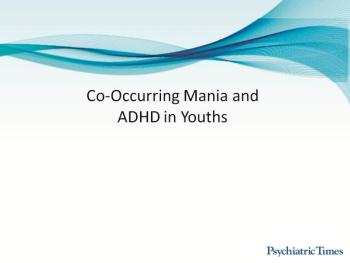
Consider Nico-he is a bilingual dog-he understands and responds to both Russian and English because both languages are spoken at home.

Consider Nico-he is a bilingual dog-he understands and responds to both Russian and English because both languages are spoken at home.

In this video, Dr Karl Doghramji, describes the various agents available for managing sleep disorders and discusses the adverse effects associated with over-the-counter, nutraceutical, and prescription sleep aids.

Evidence suggests that co-occurrence with ADHD is a marker of preadolescent-onset mania. This slideshow provides some evidence for you to decide whether this form of very early-onset mania represents a developmental subtype of the disorder.

In a PsychCongress presentation on perinatal mood disorders, Marlene Freeman, MD, stressed that treatment is essential for women with mood disorders-but whether to treat becomes complicated during a women’s reproductive years.

Big things are happening in Alzheimer disease research. Recent developments are shaping the future for assessment and diagnosis and allowing for early detection and treatment of the disease.

Because of new imaging techniques and advances in our understanding of neurophysiology, neurological and psychiatric disorders are increasingly being recognized as disorders of circuit functions in the brain. Using techniques such as DBS, neurosurgeons are able to pinpoint malfunctioning circuits and to recalibrate them.

The prevalence of professional burnout ranges from 25% to 60% among practicing physicians. No wonder then, that the workshop on physician burnout was packed at the APA annual meeting.

Sadly, type 2 diabetes mellitus is increasing in children and adolescents at a rapid rate associated with rising rates of obesity.

A lack of male mental health clinicians is having a huge effect on men who would otherwise benefit from psychotherapy.

A shortage of inpatient beds and staff at mental health facilities may mean that a patient presenting to an emergency department may be there for an extended period of time.

Recently, NARSAD presented its achievement awards for 2010-awards given to physicians and scientists doing cutting-edge work to better understand the mechanisms and causes of mental illness.

Creative people tend to see the world in novel and unconventional ways, and they often seek out intense and destabilizing experiences. Creative ideas are frequently generated during chaotic mental states characterized by loosening of associations that resemble the psychosis of mania or schizophrenia.

In reading fiction, we often find very interesting characters, which we suspect may have a psychiatric disorder-whether this is intentional on the part of the author, we’re not sure. As practicing psychiatrists, you are the experts on what ails some of these characters. So, tell us what your take is. If this were someone who came to see you, what would be your diagnosis?

Award ceremonies abound, from the Oscars for film to the Clio awards for advertising, but none are as important to mental health and psychiatry as the NARSAD annual awards. NARSAD is a unique organization that is dedicated to mental health research, and the NARSAD awards are considered to be the most prestigious prizes in psychiatric research. On October 30, NARSAD presented its 22nd annual awards for outstanding achievement in mental health research. This year the prizes went to 8 distinguished scientists whose work is making a huge impact on the way psychiatric disorders will be diagnosed and treated.

In August, the American Psychological Association Task Force on Appropriate Therapeutic Responses to Sexual Orientation released a report based on its systematic review of research on the effectiveness of sexual orientation change efforts.1

In response to the resolution made in 2008 by the US Congress that proclaimed May to be borderline personality disorder (BPD) awareness month, the American Psychiatric Association (APA) decided to make BPD a key track of this year’s meeting. Among the several excellent presentations on BPD was Dr John G. Gunderson’s lecture on the ontogeny of the disorder. Having spent the past 30+ years studying BPD, both as a researcher and a clinician, Dr Gunderson of McLean Hospital of Harvard Medical School is an expert on the history of BPD.

Cardiovascular disease kills more people worldwide than everything else combined, said Dean Ornish, MD, cardiologist and clinical professor of medicine at the University of California in San Francisco. Dr Ornish is well known for his lifestyle-driven approach to the control of cardiovascular disease. Depending on the extent of personalized lifestyle changes, disease progression can be stopped and even reversed.

Kia Faridi MD, a psychiatrist at McGill University in Montreal, discusses the results of his study on the impact of marijuana use in patients with psychotic symptoms.

Christopher Janish, BA and Melanie Buskirk, BS, students at the Mayo Clinic in Rochester, Minn, discuss the results of their study on representations of homicide portrayed in dramatic television series compared with US homicide data from the CDC’s National Violent Death Reporting System.

Diagnosing Alzheimer disease at its earliest stage can lead to effective early interventions.